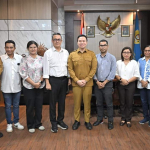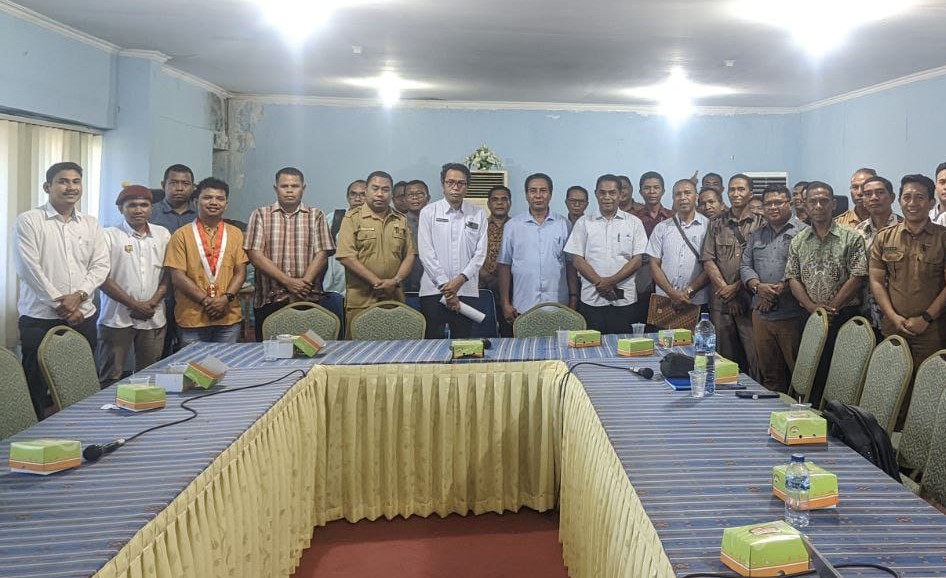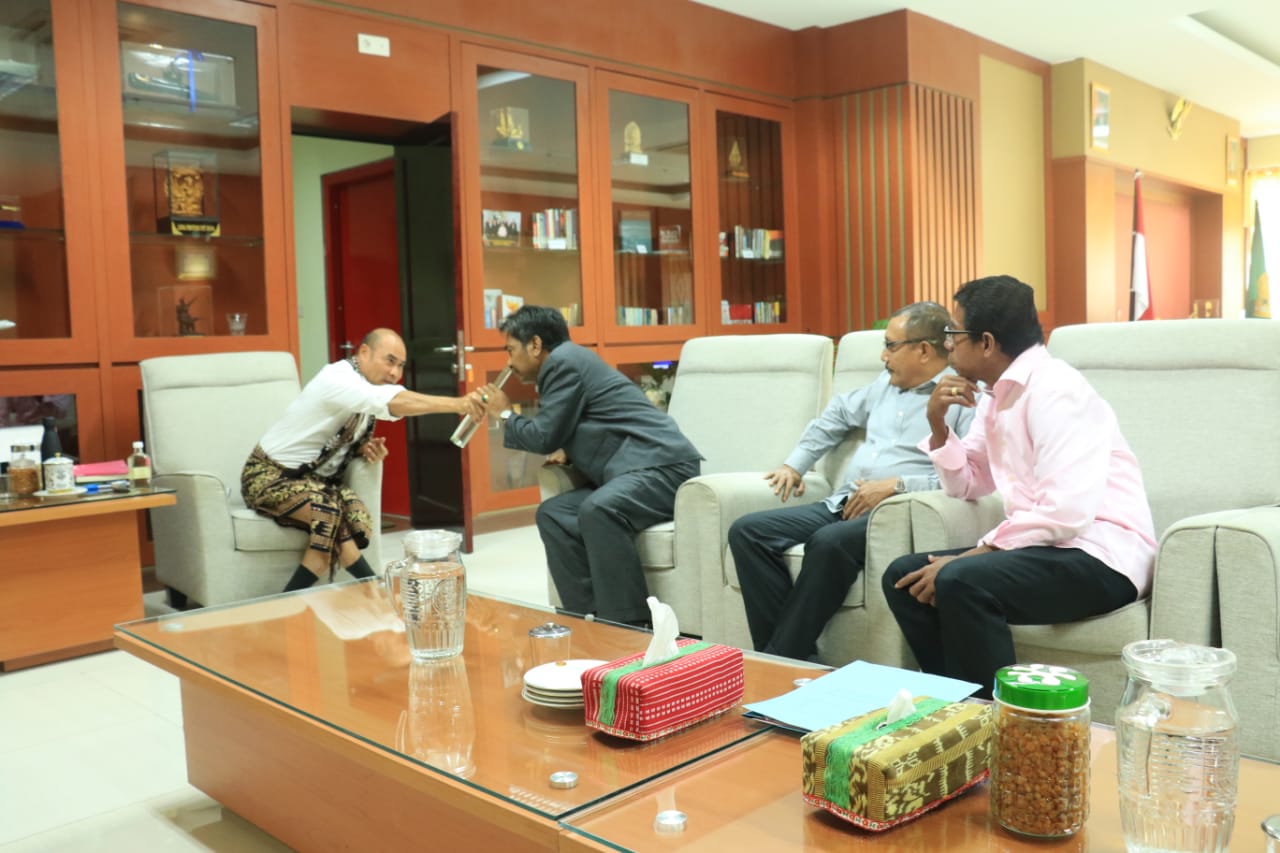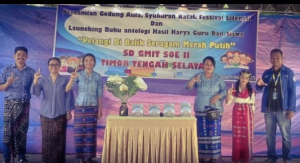Four Reasons You Should Participate in Student Exchange Program
- account_circle Penulis
- calendar_month Rab, 24 Nov 2021
- visibility 138
- comment 0 komentar

Author (left) volunteered with her international friends from Colombia and Brasil
![]()
Author : Picessylia Safiransi Anakay
The Ministry of Education and Culture and Research and Technology commenced the Merdeka Belajar-Kampus Merdeka curriculum as a scheme to begin preparing students to become strong scholars, cater to the needs of the times, and be fully prepared to be a pioneer with high revolutionary spirit.
Therefore, according to chapters 14 and 15 of Permendikbud No. 3 of year 2020 on the National Standards for Higher Education, students at universities have the option of studying outside of their study program at the same or another institution and earning credits. This possibility can come in the form of a student exchange program.
As an example, to follow through with this regulation Indonesian International Student Mobility Awards (IISMA) Program was established to allow students from Indonesian universities to engage in the learning process at any prestigious university in the world, in order to broaden and deepen their understanding and competence in the real world, based on their preferences and hopes for the future. An attempt like this by the Indonesian government should be appreciated, however the question now is: “To what extent will student exchange programs benefit students in their academic progress?”
Student exchange programs provide more than just the opportunity to travel and listen to lectures from various professors. It is available for students to allow them to exchange culture (Sapkota, 2015: 6—41), to bring understanding of common stereotypes of people (Stangor, Jonas, Stroebe, & Hewstone, 1996:663—675), to build friendship and networking (Hendrickson, 2016:47—69) and to seek opportunities to bridge collaborative work between home and host universities (Atalar, 2020:63—71).

Author when visited Pentagon, Washington DC, USA
International exchange is a program in which a person is exposed to a new environment in order to broaden his or her awareness of other cultures, religions, communities, societies, and languages at various levels. Students could indeed expand their horizons through studying overseas and gain a deeper understanding and overview of concerns and phenomena from a long-term, global perspective. It is easier to think critically about oneself and one’s native nation if one has extensive experience in another culture. It fosters a sense of respect for variety and increases tolerance for differences. International interaction exposes people to different ideas and lifestyles. It inspires people to look at their own culture in new ways. It is possible to develop the ability to question those beliefs and impressions that one has taken for granted.
Moreover, people’s perceptions are shaped by their upbringing in a specific community and culture. In society, people are built in particular ways. When they leave their comfort zone to explore a new region of the globe, they will be amazed and their perceptions are challenged. International student exchange is a great way to see a different area of the world. One has the opportunity to see the host country as well as travel to its neighboring countries. It provides a pupil who has never lived outside of his or her birthplace with understanding of the new place’s geographical variety and socioeconomic disparities. For example, a participant of Diaconia University of Applied Sciences 2013 exchange program grew up in a strict Hindu household with many limitations. Traveling from Asia to Europe and Africa exposed one to a wide variety of cultures, people, and religions. These encounters and experiences have considerably widened one’s horizons and increased one’s tolerance for diversity. (Sapkota, 2015: 6).
Student exchange programs can assist in gaining a better and real understanding regarding certain people’s views toward, and preconceptions of certain social groups which are heavily influenced by their interactions with individual members of those groups, and that such interactions will, under some circumstances, lead to more favourable intergroup judgments. This notion is often referred to as ethnic stereotype or racial stereotype, and it defines a set of assumptions about the usual features of people of a certain ethnicity or nationality, as well as their position, socioeconomic, and cultural standards.
We may take the example of preconceptions about Americans to better illustrate this notion. Americans are believed to be extremely giving. The United States provides help and supplies to a variety of nations, and Americans may be viewed as generous or humanitarian people. However, no matter how positive a stereotype may appear, it may well be damaging since it can drive us to treat individuals in particular ways depending on our assumptions about them.
Students who have the opportunity to live and immerse themselves in other cultures will be able to see the reality behind whatever prejudices they may have had about specific ethnic groups, and ideally will change their conduct as a result of discovering the truth. Consider how college students from the United States of America who spent a year studying in either West Germany or the United Kingdom discovered that their biases and attitudes about individuals from the host nation shifted drastically during their time there. (Stangor; Jonas; Stroebe & Hewstone, 1996: 664). The amount to which the participant has meaningful direct interaction with people of the host nation is likely to be the most essential aspect of the exchange program’s effectiveness. Positive attitude transformation is more likely to occur when programs are designed such that students may have direct intergroup contact.
International students participating in exchange programs can profit from cross-national relationships because they can function as significant close relationships while still optimizing cultural learning. Students talk about the new culture and share their experiences with other students who are going through similar feelings. These relationships also provide a sense of cultural identification, emotional support, and a way for students to cope with the stress of culture shock once they reside in the host country.
Beside that, building friendships with the host country’s citizens is crucial to the adaptation process as well. As a result, it’s critical to engage in a variety of interpersonal contact activities with people from the host nation. Local contacts provide cultural information and resources that foreign students could not get from folks in their own country or from other international students.
However, to grow such connections takes time, for example students who participated in exchange programs meet and get to know each other not only when they first arrive, but also throughout the semester. As a result, students form extremely close ties with one another (Hendrickson, 2016: 52).

Author represented Indonesia during an event organized by local church community in Annandale, Northern Virginia, USA
Both the host and visiting countries should profit from a student exchange program, which requires collaboration between institutions.
As a result of globalization, graduates of colleges are expected to be able to connect with individuals from many cultures and backgrounds in order to succeed in the worldwide job market. Hence, higher education institutions face additional problems as a natural outcome of this. Universities must appropriately educate their students for such a global setting in order to increase the employability of their graduates. Universities are responding by seeking to expand their student exchange programs and encouraging students to join.
Students who are given the opportunity to represent their home universities can function as a link between the two institutions, allowing them to reap the full benefits of their partnership. Universities will generate not only skilled students who are fully equipped to compete in the global job market, but they will also be able to participate in research collaborations between the two institutions.
For example, a graduate student exchange agreement between a developed and developing country, as well as the resulting research collaboration, benefits both parties: the developing country provides highly driven graduate students, while the developed country provides comprehensive research facilities and renowned academic staff (Atalar, 2020: 64).
In summary, students should participate in student exchange programs to receive opportunities to exchange cultures, gain a better knowledge of common assumptions about people, develop friendships and network, and look for chances to collaborate. At different levels, an individual is exposed to a new environment in order to enhance his or her understanding of other cultures, religions, communities, societies, and languages through international exchange programs
Student exchange programs can also help individuals develop a better understanding of people’s attitudes regarding, and perceptions concerning, other social groupings. Moreover, cross-national ties can help international students participating in exchange programs since they can serve as vital intimate bonds while also boosting cultural learning.
Then, a student exchange program, which involves coordination between institutions, should benefit both the host and visiting nations. Participating in a student exchange program, which was sponsored by the US Department of State and supported by the US government, has been characterized as a life-changing experience by recipients of the Youth Ambassadors Program.
Argentina’s José I Vieux said that he was given a behind-the-scenes peek into American life. While Alexia Paz, a Chilean, visited with local firemen and groups which help children and their families who are struggling financially. Alexia
Foto (*/personal collection)
- Penulis: Penulis




























